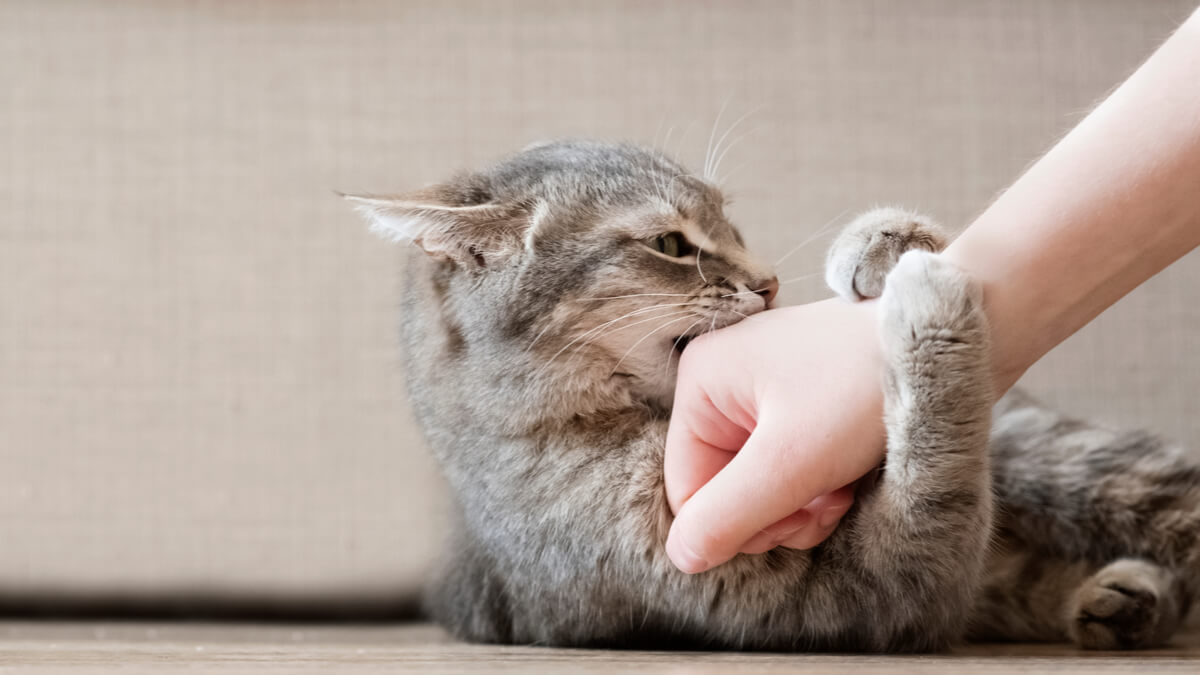4 Tips to Prevent Your Cat from Biting You

Biting and scratching is part of the feline game. However, this doesn’t mean that you can’t prevent your cat from biting you. These pets can adapt their play through learning, like any species of mammal.
Often times, this behavior – aggressive or not – gives cats a reputation for being surly or unpleasant. In this article, we’re going to have a closer look at feline biting behavior, in order to better understand it and provide you with tips to avoid it.
Why would your cat bite you?
Biting, for cats, has several uses: hunting, transporting objects, defending themselves, eating, and playing etc. However, when the bites are repeated and focus on the human they live with, they need to be analyzed to correct this behavior. So, why does the cat bite the hand that feeds it?! There are multiple reasons:
- Play: Cats play at hunting, and moving hands or feet are often good candidates for fictitious prey to practice with.
- Organic causes: An atypical increase in aggressiveness and biting can be indicative of pain or illness in the feline. Pathologies must be ruled out before diagnosing this behavior.
- Fear and / or stress: A cat that is in constant fear, anxiety, or stress will be one that scratches and bites on seeing gestures that it should recognize as harmless.
- Traumatic experiences: Cats that have been abused or picked up from the street, for example, are prone to developing aggression. Poor cat socialization also leads to this type of behavior.
As you can see, none of these causes reflects on the personality of the feline. Although it’s true that some cats are more detached than others, respecting their space will never be a trigger for biting or aggressiveness.

4 tips to prevent your cat from biting you
As with any truly effective method of modifying an animal’s behavior, punishment isn’t an option. There are many things you can do to prevent your cat from biting you without resorting to anger or violence. Here are 4 of them.
1. The benefits of quiet play
Quiet play allows you to shift the focus of your cat’s attention to something other than you, such as a toy. This, in turn, is most helpful in keeping the cat’s nervousness levels within healthy limits.
Using fishing rod-type gadgets, which allow them to hunt something that isn’t you, encourages your cat to play with you without you being the toy! Smell enrichment or intelligence challenges complement quiet play well, keeping cats busy and avoiding stress.
2. Avoid reinforcing biting behavior
If your cat has gotten into the habit of biting you when you play with him, it’s important that you let them know that your hands are not a toy or prey. To set this limit, it’s usually enough to stop the game when it bites you. There’s no need to scold or say anything, as you just have to be consistent with this guideline.
3. Create a quiet and safe environment
If the feline has developed this behavior as a result of a sudden change in its routine, it’s possible that the environment contains some element of stress that is disturbing it. Identify what it is and eliminate it, with the aim of creating an environment that favors calm when playing.
4. Preventing your cat from biting you is also a matter of socialization
When you adopt a kitten, it’s very possible that they will spend their period of socialization with you. If they live with other cats, they will teach them how far you can go with biting while playing, but if it’s the only cat, then you must instruct him.
It’s important that you don’t use hands or feet to play with them and that you’re consistent in correcting bad behavior. In this period, your feline’s behavior will be much more moldable, so you shouldn’t have much difficulty getting to know and understand them.

One last tip to prevent your cat from biting you
It may be that even by respecting their space, filling their life with enrichment, and using behavior modification techniques, the problem doesn’t go away. Don’t despair, sometimes you need the help of a professional and that’s not a bad thing.
Both going to the vet to rule out diseases and turning to an ethologist are options that help at the beginning of the process or when you no longer know what else to do. Mastering communication with your cat is key to a happy life for both of you, and these professionals can help you achieve that.
Biting and scratching is part of the feline game. However, this doesn’t mean that you can’t prevent your cat from biting you. These pets can adapt their play through learning, like any species of mammal.
Often times, this behavior – aggressive or not – gives cats a reputation for being surly or unpleasant. In this article, we’re going to have a closer look at feline biting behavior, in order to better understand it and provide you with tips to avoid it.
Why would your cat bite you?
Biting, for cats, has several uses: hunting, transporting objects, defending themselves, eating, and playing etc. However, when the bites are repeated and focus on the human they live with, they need to be analyzed to correct this behavior. So, why does the cat bite the hand that feeds it?! There are multiple reasons:
- Play: Cats play at hunting, and moving hands or feet are often good candidates for fictitious prey to practice with.
- Organic causes: An atypical increase in aggressiveness and biting can be indicative of pain or illness in the feline. Pathologies must be ruled out before diagnosing this behavior.
- Fear and / or stress: A cat that is in constant fear, anxiety, or stress will be one that scratches and bites on seeing gestures that it should recognize as harmless.
- Traumatic experiences: Cats that have been abused or picked up from the street, for example, are prone to developing aggression. Poor cat socialization also leads to this type of behavior.
As you can see, none of these causes reflects on the personality of the feline. Although it’s true that some cats are more detached than others, respecting their space will never be a trigger for biting or aggressiveness.

4 tips to prevent your cat from biting you
As with any truly effective method of modifying an animal’s behavior, punishment isn’t an option. There are many things you can do to prevent your cat from biting you without resorting to anger or violence. Here are 4 of them.
1. The benefits of quiet play
Quiet play allows you to shift the focus of your cat’s attention to something other than you, such as a toy. This, in turn, is most helpful in keeping the cat’s nervousness levels within healthy limits.
Using fishing rod-type gadgets, which allow them to hunt something that isn’t you, encourages your cat to play with you without you being the toy! Smell enrichment or intelligence challenges complement quiet play well, keeping cats busy and avoiding stress.
2. Avoid reinforcing biting behavior
If your cat has gotten into the habit of biting you when you play with him, it’s important that you let them know that your hands are not a toy or prey. To set this limit, it’s usually enough to stop the game when it bites you. There’s no need to scold or say anything, as you just have to be consistent with this guideline.
3. Create a quiet and safe environment
If the feline has developed this behavior as a result of a sudden change in its routine, it’s possible that the environment contains some element of stress that is disturbing it. Identify what it is and eliminate it, with the aim of creating an environment that favors calm when playing.
4. Preventing your cat from biting you is also a matter of socialization
When you adopt a kitten, it’s very possible that they will spend their period of socialization with you. If they live with other cats, they will teach them how far you can go with biting while playing, but if it’s the only cat, then you must instruct him.
It’s important that you don’t use hands or feet to play with them and that you’re consistent in correcting bad behavior. In this period, your feline’s behavior will be much more moldable, so you shouldn’t have much difficulty getting to know and understand them.

One last tip to prevent your cat from biting you
It may be that even by respecting their space, filling their life with enrichment, and using behavior modification techniques, the problem doesn’t go away. Don’t despair, sometimes you need the help of a professional and that’s not a bad thing.
Both going to the vet to rule out diseases and turning to an ethologist are options that help at the beginning of the process or when you no longer know what else to do. Mastering communication with your cat is key to a happy life for both of you, and these professionals can help you achieve that.
All cited sources were thoroughly reviewed by our team to ensure their quality, reliability, currency, and validity. The bibliography of this article was considered reliable and of academic or scientific accuracy.
- Kitten Plays Too Rough. (2020). Best Friends Animal Society. https://resources.bestfriends.org/article/kitten-plays-too-rough
- Cat Behavior Modification and Counter-Conditioning. (2015). Best Friends Animal Society. https://resources.bestfriends.org/article/cat-behavior-modification-and-counter-conditioning
- Aggression in Cats Toward People. (2016). Best Friends Animal Society. https://resources.bestfriends.org/article/aggression-cats-toward-people
This text is provided for informational purposes only and does not replace consultation with a professional. If in doubt, consult your specialist.








